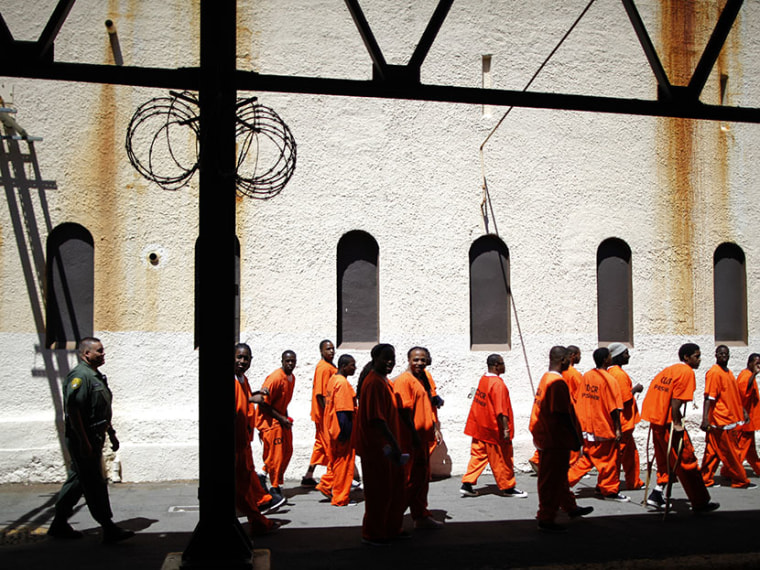Attorney General Eric Holder called for overhauling the way in which the Justice Department prosecutes minor drug cases, announcing Monday that federal prosecutors will stop charging low-level drug offenders with crimes carrying strict mandatory minimum sentences.
Holder noted that the rapid rise in the U.S. prison population has slowed in recent years. Still, “too many Americans go to too many prisons for far too long and for no good law enforcement reason.”
The announcement at the American Bar Association’s meeting in San Francisco will almost certainly help save many young black men from incarceration and leave an imprint on Holder’s legacy as the nation's first black attorney general.
According to Justice Department, approximately 220,000 people are currently incarcerated, with nearly half serving time for drug related crimes. The bureau of prisons is operating at 40% above capacity and about a quarter of the department’s budget goes to prison-related operations.
Holder's policy change will help reduce the population, which has grown about 800% since 1980, largely due to harsh drug sentencing.
The new policy affects federal prisoners and low-level, nonviolent drug offenders who have no connection to cartels, gangs, or other organizations. Judges will now be allowed to decide sentence length based on the individual and his or her history.
Incarceration should be used to “punish deter and rehabilitate, not merely to convict, warehouse and forget,” Holder said in unveiling the new policy shift. He said mandatory minimum sentencing has cost the government $80 billion in 2010 alone.
Left unsaid was the dwindling use of the pardon power which the Obama administration has let atrophy under its watch. With the stroke of a pen, the president could commute the sentences of tens of thousands of prisoners serving long sentences for minor drug offenses.
Such a move, which has some measure of bipartisan support, could alleviate overcrowding in federal prisons immediately and start many convicts on the path toward rehabilitation and reintegration with society.
Advocacy groups such as The Sentencing Project and Families Against Mandatory Minimums have long pushed for use of the pardon power as well as sentence reduction in the search for a more humane approach to drug offenses.
"We're really very, very encouraged by it," said Mary Price, vice president of FAMM. "We absolutely agree with [Holder] that we cannot incarcerate our way to public safety."
Also at issue for those groups has been the concept of compassionate relief – allow the terminally ill and elderly to return home for the last years of their lives.
Those pleas seemed to be heard Monday when Holder said elderly prisoners behind bars for nonviolent crimes who have served most of their sentence may be eligible for early release.
"Today, a vicious cycle of poverty, criminality, and incarceration traps too many Americans and weakens too many communities," he said. "However, many aspects of our criminal justice system may actually exacerbate this problem, rather than alleviate it."
While polls show the president is likely to see public support for the shift on sentencing policy, it could also draw criticism from those who argue that Obama and Holder are “soft,” on crime.
